David Ruffle's Blog, page 9
June 14, 2013
THE AMATEUR EXECUTIONER
'The Amateur Executioner' is a collaboration between two noted Holmes writers, Dan Andriacco and Kieran McMullen. I am never quite sure how these collaborations work, but I suspect they weren't thrown into a locked room together and told not to come out until they had completed the book. I am involved in a collaboration myself (the ever impending 'Scarborough Affair') which chiefly consists of me sitting quietly as my partner does all the writing, but I digress.
Enoch Hale, a Boston bred reporter is one of the first on the scene of an apparent suicide, but things
 are not what they seem. This is the latest in a series of murders and as the dogged Hale sets out to both cover these crimes and uncover the killer he gets a little help along the way from an assortment of well known folk; Alfred Hitchcock, WB Yeats, TS Eliot etc.....and Sherlock Holmes! The blending of real characters, real history with fictional characters and fictional history is very well accomplished and at no time does the insertion of these 'guest stars' overshadow the very well thought out and exciting plot. There may not be a major part for Holmes to play, but his 'fingerprints' are all over the plot and you do gain the impression that this novel could only have been written by a Holmesian, or in this case, two Holmesians. It is a very enjoyable read, fast paced and undoubtedly fun. You see, collaborations can work. And work well.
are not what they seem. This is the latest in a series of murders and as the dogged Hale sets out to both cover these crimes and uncover the killer he gets a little help along the way from an assortment of well known folk; Alfred Hitchcock, WB Yeats, TS Eliot etc.....and Sherlock Holmes! The blending of real characters, real history with fictional characters and fictional history is very well accomplished and at no time does the insertion of these 'guest stars' overshadow the very well thought out and exciting plot. There may not be a major part for Holmes to play, but his 'fingerprints' are all over the plot and you do gain the impression that this novel could only have been written by a Holmesian, or in this case, two Holmesians. It is a very enjoyable read, fast paced and undoubtedly fun. You see, collaborations can work. And work well.
The Amateur Executioner is available from all good bookstores including in the USA Amazon, Barnes and Noble, in the UK Amazon, Waterstones, and for everywhere else Book Depository who offer free worldwide delivery. In ebook format there is Kindle, iPad and Kobo

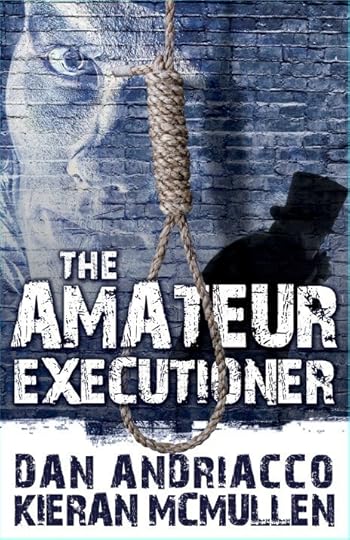

Dan Andriacco discovered Sir Arthur Conan Doyle's original Sherlock Holmes stories at about the age of nine. Not long after, he became acquainted with such greats of the Golden Age of detective fiction as Agatha Christie, Ellery Queen, Rex Stout, John Dickson Carr, Erle Stanley Gardner, and many more. He has been a member of the Tankerville Club, a Cincinnati-based scion society of the Baker Street Irregulars, since 1981. That connection is reflected in many ways in his book Baker Street Beat: An Eclectic Collection of Sherlockian Scribblings. Andriacco, known to friends as "Doctor Dan," holds a Doctor of Ministry degree from Columbia Theological Seminary in Georgia. He was born in 1952 in Cincinnati, Ohio, where he lives with his wife, Ann. They have three adult children and four grandchildren. http://bakerstreetbeat.blogspot.co.uk/
Kieran on himself: I have been a lifelong Holmes fan, a competitive shooter and a Civil War cannon enthusiast. We’ve raised horses and Irish Wolfhounds and lived on a small farm in Rush Springs, Oklahoma for 29 years. Rush Springs is the Watermelon Capital (at least of Oklahoma) and has about the finest people you want to meet. Helen (his wife who he met in 1982) and I spent 20 years on the Acme Fire Department (Yes, like where Wylee Coyote gets his dynamite) and were in law enforcement for about 12 years. I’m now able to follow my other passions, Irish History and the Holmes Stories as well as participate in a number of civic organizations. For many years I was on the Board of Directors of the US Field Artillery Association, and ran live fire Civil War Cannon competitions at the home of the Field Artillery, Fort Sill, Oklahoma. I am currently active with the Knights of Columbus (surprise!), The local VFW and the American Legion where we now live, just north of Darien, Georgia. At some point in all this I love to find time to write. http://kieranmcmullen.com/
Show more Show less
Enoch Hale, a Boston bred reporter is one of the first on the scene of an apparent suicide, but things
 are not what they seem. This is the latest in a series of murders and as the dogged Hale sets out to both cover these crimes and uncover the killer he gets a little help along the way from an assortment of well known folk; Alfred Hitchcock, WB Yeats, TS Eliot etc.....and Sherlock Holmes! The blending of real characters, real history with fictional characters and fictional history is very well accomplished and at no time does the insertion of these 'guest stars' overshadow the very well thought out and exciting plot. There may not be a major part for Holmes to play, but his 'fingerprints' are all over the plot and you do gain the impression that this novel could only have been written by a Holmesian, or in this case, two Holmesians. It is a very enjoyable read, fast paced and undoubtedly fun. You see, collaborations can work. And work well.
are not what they seem. This is the latest in a series of murders and as the dogged Hale sets out to both cover these crimes and uncover the killer he gets a little help along the way from an assortment of well known folk; Alfred Hitchcock, WB Yeats, TS Eliot etc.....and Sherlock Holmes! The blending of real characters, real history with fictional characters and fictional history is very well accomplished and at no time does the insertion of these 'guest stars' overshadow the very well thought out and exciting plot. There may not be a major part for Holmes to play, but his 'fingerprints' are all over the plot and you do gain the impression that this novel could only have been written by a Holmesian, or in this case, two Holmesians. It is a very enjoyable read, fast paced and undoubtedly fun. You see, collaborations can work. And work well.The Amateur Executioner is available from all good bookstores including in the USA Amazon, Barnes and Noble, in the UK Amazon, Waterstones, and for everywhere else Book Depository who offer free worldwide delivery. In ebook format there is Kindle, iPad and Kobo



Dan Andriacco discovered Sir Arthur Conan Doyle's original Sherlock Holmes stories at about the age of nine. Not long after, he became acquainted with such greats of the Golden Age of detective fiction as Agatha Christie, Ellery Queen, Rex Stout, John Dickson Carr, Erle Stanley Gardner, and many more. He has been a member of the Tankerville Club, a Cincinnati-based scion society of the Baker Street Irregulars, since 1981. That connection is reflected in many ways in his book Baker Street Beat: An Eclectic Collection of Sherlockian Scribblings. Andriacco, known to friends as "Doctor Dan," holds a Doctor of Ministry degree from Columbia Theological Seminary in Georgia. He was born in 1952 in Cincinnati, Ohio, where he lives with his wife, Ann. They have three adult children and four grandchildren. http://bakerstreetbeat.blogspot.co.uk/
Kieran on himself: I have been a lifelong Holmes fan, a competitive shooter and a Civil War cannon enthusiast. We’ve raised horses and Irish Wolfhounds and lived on a small farm in Rush Springs, Oklahoma for 29 years. Rush Springs is the Watermelon Capital (at least of Oklahoma) and has about the finest people you want to meet. Helen (his wife who he met in 1982) and I spent 20 years on the Acme Fire Department (Yes, like where Wylee Coyote gets his dynamite) and were in law enforcement for about 12 years. I’m now able to follow my other passions, Irish History and the Holmes Stories as well as participate in a number of civic organizations. For many years I was on the Board of Directors of the US Field Artillery Association, and ran live fire Civil War Cannon competitions at the home of the Field Artillery, Fort Sill, Oklahoma. I am currently active with the Knights of Columbus (surprise!), The local VFW and the American Legion where we now live, just north of Darien, Georgia. At some point in all this I love to find time to write. http://kieranmcmullen.com/
Show more Show less
Published on June 14, 2013 00:30
June 13, 2013
Nice
Picked up a nice review of Holmes and Watson: End Peace from very well respected Holmes author, Hugh Ashton. Quite a rarity really for he tends not to review other author's works. Thanks, Hugh!
'I don't read Sherlock Holmes pastiches - I write them, and I avoid reading pastiches on the whole, for fear I will inadvertently copy someone else's ideas. But having read about End Peace, I thought I
could risk this work. It's a fascinating concept in the technical sense - a book that is all dialogue with no description at all. To describe it as a "novel" is perhaps a mistake. It's a work of Holmesian scholarship, examining the details of one of the most famous fictional relationships in English literature. Both Holmes and Watson talk freely about their experiences, their relationship, and their lives before they met each other. Each reveals secrets which he has kept hidden from the other, and which help to explain the seeming contradictions in Watson's work (Ruffle plays The Game wonderfully - even leading Holmes and Watson to ask if in the future they might possibly be regarded as fictional characters). The interchange is set in a delicate and moving framework which contains a mystery in itself. Indeed, the setting is so moving that I was almost in tears at the end of the book. For anyone who has read the canon, and wishes to know more about the characters, this is a good starting point. Maybe none of Ruffle's ideas is stunningly original (a point he admits in his introduction), but each is beautifully introduced, explained and presented.'
scholarship, examining the details of one of the most famous fictional relationships in English literature. Both Holmes and Watson talk freely about their experiences, their relationship, and their lives before they met each other. Each reveals secrets which he has kept hidden from the other, and which help to explain the seeming contradictions in Watson's work (Ruffle plays The Game wonderfully - even leading Holmes and Watson to ask if in the future they might possibly be regarded as fictional characters). The interchange is set in a delicate and moving framework which contains a mystery in itself. Indeed, the setting is so moving that I was almost in tears at the end of the book. For anyone who has read the canon, and wishes to know more about the characters, this is a good starting point. Maybe none of Ruffle's ideas is stunningly original (a point he admits in his introduction), but each is beautifully introduced, explained and presented.'
Holmes and Watson End Peace is available from bookstores including in the USA Barnes and Noble and Amazon, in the UK Waterstones, Amazon and Book Depository (free worldwide delivery).
And further links to where you can find my other works:
Sherlock Holmes and The Lyme Regis Horror is available from all good bookstores worldwide including in the USA Amazon and Barnes and Noble, in the UK Amazon, Waterstones . Fans outside the US and UK can get free delivery from Book Depository. In ebook format it is in Amazon Kindle, Kobo, Nook and Apple iBooks(iPad/iPhone).
Sherlock Holmes and The Lyme Regis Legacy is available from all good bookstores worldwide including in the USA Amazon, Classic Specialities and Barnes and Noble, in the UK Amazon and Waterstones, elsewhere Book Depository offer free worldwide delivery - and in all electronic formats including Amazon Kindle, Nook, Kobo and Apple iBooks (iPad/iPhone).
Sherlock Holmes and The Lyme Regis Trials is available from all good bookstores worldwide including in the USA Amazon and Barnes and Noble, in the UK Amazon, Waterstones . Fans outside the US and UK can get free worldwide delivery from Book Depository - and in all electronic formats including Amazon Kindle, Kobo and Apple iBooks (iPad/iPhone).
Sherlock Holmes and The Missing Snowman is available from all good bookshops including in the USA Barnes and Noble and Amazon , in the UK Amazon and Waterstones. For elsewhere Book Depository who offer free delivery worldwide. In ebook format it is in Kindle, Kobo,Nook and iPad.
And a link to Hugh Ashton's website: http://221beanbakerstreet.info/author.html
'I don't read Sherlock Holmes pastiches - I write them, and I avoid reading pastiches on the whole, for fear I will inadvertently copy someone else's ideas. But having read about End Peace, I thought I
could risk this work. It's a fascinating concept in the technical sense - a book that is all dialogue with no description at all. To describe it as a "novel" is perhaps a mistake. It's a work of Holmesian
 scholarship, examining the details of one of the most famous fictional relationships in English literature. Both Holmes and Watson talk freely about their experiences, their relationship, and their lives before they met each other. Each reveals secrets which he has kept hidden from the other, and which help to explain the seeming contradictions in Watson's work (Ruffle plays The Game wonderfully - even leading Holmes and Watson to ask if in the future they might possibly be regarded as fictional characters). The interchange is set in a delicate and moving framework which contains a mystery in itself. Indeed, the setting is so moving that I was almost in tears at the end of the book. For anyone who has read the canon, and wishes to know more about the characters, this is a good starting point. Maybe none of Ruffle's ideas is stunningly original (a point he admits in his introduction), but each is beautifully introduced, explained and presented.'
scholarship, examining the details of one of the most famous fictional relationships in English literature. Both Holmes and Watson talk freely about their experiences, their relationship, and their lives before they met each other. Each reveals secrets which he has kept hidden from the other, and which help to explain the seeming contradictions in Watson's work (Ruffle plays The Game wonderfully - even leading Holmes and Watson to ask if in the future they might possibly be regarded as fictional characters). The interchange is set in a delicate and moving framework which contains a mystery in itself. Indeed, the setting is so moving that I was almost in tears at the end of the book. For anyone who has read the canon, and wishes to know more about the characters, this is a good starting point. Maybe none of Ruffle's ideas is stunningly original (a point he admits in his introduction), but each is beautifully introduced, explained and presented.'Holmes and Watson End Peace is available from bookstores including in the USA Barnes and Noble and Amazon, in the UK Waterstones, Amazon and Book Depository (free worldwide delivery).
And further links to where you can find my other works:
Sherlock Holmes and The Lyme Regis Horror is available from all good bookstores worldwide including in the USA Amazon and Barnes and Noble, in the UK Amazon, Waterstones . Fans outside the US and UK can get free delivery from Book Depository. In ebook format it is in Amazon Kindle, Kobo, Nook and Apple iBooks(iPad/iPhone).
Sherlock Holmes and The Lyme Regis Legacy is available from all good bookstores worldwide including in the USA Amazon, Classic Specialities and Barnes and Noble, in the UK Amazon and Waterstones, elsewhere Book Depository offer free worldwide delivery - and in all electronic formats including Amazon Kindle, Nook, Kobo and Apple iBooks (iPad/iPhone).
Sherlock Holmes and The Lyme Regis Trials is available from all good bookstores worldwide including in the USA Amazon and Barnes and Noble, in the UK Amazon, Waterstones . Fans outside the US and UK can get free worldwide delivery from Book Depository - and in all electronic formats including Amazon Kindle, Kobo and Apple iBooks (iPad/iPhone).
Sherlock Holmes and The Missing Snowman is available from all good bookshops including in the USA Barnes and Noble and Amazon , in the UK Amazon and Waterstones. For elsewhere Book Depository who offer free delivery worldwide. In ebook format it is in Kindle, Kobo,Nook and iPad.
And a link to Hugh Ashton's website: http://221beanbakerstreet.info/author.html
Published on June 13, 2013 08:06
June 7, 2013
Holmes and Watson: The War Years....a review.
It was the time of Queen Victoria's "Little Wars" and the "War to End All Wars". It was also the time of Sherlock Holmes and Dr John Watson. Watson, the man, would be formed by his experiences in the British "Second Afghan War", before he ever met Sherlock Holmes in an adventure, he would record this experience as Watson's Afghan Adventure, a tale of war and mystery. Later, Holmes and Watson would go on to not only share the problems of crime solving, Watson's three marriages, a purported tragedy at Reichenbach, and Holmes's return from the dead; they would also share two more wartime experiences. In Sherlock Holmes and the Mystery of the Boer Wagon, they are called on by Mycroft Holmes and the British government to go to the battleground of South Africa. Their mission is to stop the flow of army secrets to the Boers and try to recover a King's ransom in gold. By the time of their third great wartime adventure the two friends are retired, but Mycroft, and the government, need them once more as they are called on in Sherlock Holmes and the Irish Rebels. Holmes and Watson had already foiled the plans of a German espionage ring at the start of the Great War in the tale Watson called "His Last Bow." But it was not, in reality, Holmes's last bow. Holmes and Watson are sent now to the little war within a war, the killing fields of Dublin in 1916 and the Irish Rebellion. Can they stop it? And can they stop the plans of a renegade member of the Dublin Metropolitan Police? . A special hardback edition including all three bestselling Sherlock Holmes novels from Kieran McMullen.
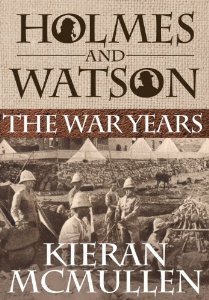 This hardback edition of Kieran McMullen's three Holmes novels looks very handsome indeed and the content no less so. The author is an ex-Army man and this shows itself in the details of Army life which we can be confident has been checked and double checked. These details however do not in any way overshadow the action or get in the way of a good story (which these are). Watson's Afghan Adventure fills in all the details of Watson's campaign in Afghanistan and gives us the Doctor Watson that we know....courageous, loyal and far from stupid. It is at time harrowing although not without humour and the author paints a very vivid picture of camp life with an array of characters all finely drawn. 'The Mystery of the Boer Wagon' is my own particular favourite. A tale with Holmes, Watson and Conan Doyle acting together to seek out a leak of military information and a no small matter or recovering stolen gold. A rollicking adventure, it fairly rattles along and introduces us to some great characters along the way including a young, very young Basil Rathbone! A hugely enjoyable read which amply rewards the time spent in reading it. Highly recommended. 'Sherlock Holmes and the Irish Rebels' is a different kettle of fish. The mood is downbeat, although no less exciting than the previous two novels. This is 1916 and the time of the Easter uprising in Ireland and Holmes and Watson find themselves catapulted into the action. One gets the impression that neither man had any stomach for what they have been asked to do. It was a desperately sad time for all concerned and it is impossible to stand outside the GPO in Dublin and not think of the cruel fate in store for the ringleaders. Not England's finest hour and we get the mood of this from the final chapter. Not an easy read then, but a very good one.
This hardback edition of Kieran McMullen's three Holmes novels looks very handsome indeed and the content no less so. The author is an ex-Army man and this shows itself in the details of Army life which we can be confident has been checked and double checked. These details however do not in any way overshadow the action or get in the way of a good story (which these are). Watson's Afghan Adventure fills in all the details of Watson's campaign in Afghanistan and gives us the Doctor Watson that we know....courageous, loyal and far from stupid. It is at time harrowing although not without humour and the author paints a very vivid picture of camp life with an array of characters all finely drawn. 'The Mystery of the Boer Wagon' is my own particular favourite. A tale with Holmes, Watson and Conan Doyle acting together to seek out a leak of military information and a no small matter or recovering stolen gold. A rollicking adventure, it fairly rattles along and introduces us to some great characters along the way including a young, very young Basil Rathbone! A hugely enjoyable read which amply rewards the time spent in reading it. Highly recommended. 'Sherlock Holmes and the Irish Rebels' is a different kettle of fish. The mood is downbeat, although no less exciting than the previous two novels. This is 1916 and the time of the Easter uprising in Ireland and Holmes and Watson find themselves catapulted into the action. One gets the impression that neither man had any stomach for what they have been asked to do. It was a desperately sad time for all concerned and it is impossible to stand outside the GPO in Dublin and not think of the cruel fate in store for the ringleaders. Not England's finest hour and we get the mood of this from the final chapter. Not an easy read then, but a very good one. Here is where to go to get the hardback edition of all three of Holmes’ and Watson’s wartime adventures. Follow their courageous actions and mystery solving as they fight through the great wars of their time: The Second Afghan War, the Second Boer War and the Irish Rebellion of 1916. http://www.amazon.com/Holmes-Watson-The-War-Years/dp/1780923155/ref=sr_1_1?ie=UTF8&qid=1367595198&sr=8-1&keywords=holmes+ahttp://kieranmcmullen.wordpress.com/wp-admin/media-upload.php?post_id=792&type=image&TB_iframe=1nd+Watson%3A+The+War+Years http://www.amazon.co.uk/books/dp/1780923155 http://www.bookdepository.co.uk/Holmes-Watson-War-Years-Kieran-McMullen/9781780923154

Published on June 07, 2013 00:29
May 23, 2013
An interview with Fred Thursfield....
...the author of 'Sherlock Holmes and the Discarded Cigarette' and 'Sherlock Holmes and the Terrible Secret'.
[image error]
Could you tell me a little bit about your background and upbringing?A little about myself...born...raised and lived most of my life in Calgary, Alberta...not a particularly nice sort of childhood which worked in my favour later in life because I developed a good imagination...moved to Brantford about ten years ago...for a number of reasons...one of the good things to come out of the move was my joining the Brantford Writers Circle and finding out fairly early that I was a writer. Where does Sherlock Holmes first enter your consciousness?
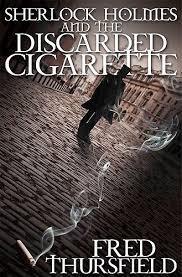 Sherlock Holmes came to me in the form of Jeremy Brett (still the best Sherlock) while watching him on television in high school...a bit later I developed a further interest and starting reading Sir Arthur Conan Doyle's books.
Sherlock Holmes came to me in the form of Jeremy Brett (still the best Sherlock) while watching him on television in high school...a bit later I developed a further interest and starting reading Sir Arthur Conan Doyle's books.
Had in been in your mind to write a Holmes pastiche long before you did so?Sherlock Holmes and the Discarded Cigarette started out as just a "what if" idea some time back and only when I got my first computer with MS Word I started writing...it was written over a two year span. I really didn't even know I was writing a pastiche at the time I just remembered bits and pieces from the original stories and as I was writing they just seemed to fit in with what I was writing at the time. Your first book was a mix of fictional characters and real ones and interestingly used a resurrected Mary Watson and a resurrected Montague John Druitt. Do these characters have a special resonance for you?
John Druitt first...while thinking up a character who would take advantage of a jilted wife to further his own criminal career I was stuck trying to create such a person...so with a little research of criminals at work in 1895 I came across a minor suspect in the Jack the Ripper case...John fitted the bill...I just changed his career to a small time art forger...who goes to an H.G. Wells reading of his first science fiction book (The Time Machine) and the story pretty much wrote itself.
Mary Watson...always an after thought...who according to Sir Arthur Conan Doyle dies two years after her marriage to John Watson...it was while I was writing the second book that I felt that John Watson should acknowledge the woman that he had been married to and the part she played in his life...it wasn't too clear about the relationship between Sherlock and Mary...so I took the initiative and had John...during Christmas, make introductions. I have a special place in my writing for Mary Watson because in the third and fourth books she takes on more importance in each story...up until now there are few strong female characters in classic Sherlock Holmes stories...the only one that comes to mind is Irene Adler...with Mary Watson as a main character I can move on from formula Sherlock Holmes stories and explore new story ideas.
Your second Holmes pastiche was set at the time of The Great War. Was this an area you were familiar with or did you learn as you wrote?
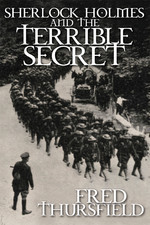 Sherlock Holmes and The Terrible Secret served a number of purposes...first it is often referred to as "the forgotten war...I wrote the book with two ideas as another "what if story" and as a brief history of the first world war...I should go back and say that I am a student of history...world war one changed the world...up until then war was almost polite and civilized...but with all the innovations and inventions war became impersonal and a matter of acceptable losses. There was a lot I knew about world war one and a lot I learned a lot while doing research.Could you tell me a little about your new venture?
Sherlock Holmes and The Terrible Secret served a number of purposes...first it is often referred to as "the forgotten war...I wrote the book with two ideas as another "what if story" and as a brief history of the first world war...I should go back and say that I am a student of history...world war one changed the world...up until then war was almost polite and civilized...but with all the innovations and inventions war became impersonal and a matter of acceptable losses. There was a lot I knew about world war one and a lot I learned a lot while doing research.Could you tell me a little about your new venture?
Right now just waiting for the release date of Sherlock Holmes and The Mystery Writer where Mary Watson through a tragic loss takes centre stage in recording the great detective's cases...I am now working on Sherlock Holmes and The Escape Artist (based on the career of Harry Houdini)...up until now all of the stories have been set some where in England...this time on the invitation of her American cousin, Mary and Sherlock have been invited to stay in New York City...where Alice (Mary's cousin) her husband Peter, Mary and Sherlock go to see a performance of Harry Houdini's feats of illusion...and where Mary at Central Park runs into a troublesome young lady she had first seen in Gravesend.
And what does the future hold for you?
Doing the background work for the fifth book Mary Watson and the Dying Doctor. Thanks for the interview David... Thanks Fred!!!
Visit Fred's website for more details about his work and where to purchase his Holmes novellas.Visit Fred here!!
[image error]
Could you tell me a little bit about your background and upbringing?A little about myself...born...raised and lived most of my life in Calgary, Alberta...not a particularly nice sort of childhood which worked in my favour later in life because I developed a good imagination...moved to Brantford about ten years ago...for a number of reasons...one of the good things to come out of the move was my joining the Brantford Writers Circle and finding out fairly early that I was a writer. Where does Sherlock Holmes first enter your consciousness?
 Sherlock Holmes came to me in the form of Jeremy Brett (still the best Sherlock) while watching him on television in high school...a bit later I developed a further interest and starting reading Sir Arthur Conan Doyle's books.
Sherlock Holmes came to me in the form of Jeremy Brett (still the best Sherlock) while watching him on television in high school...a bit later I developed a further interest and starting reading Sir Arthur Conan Doyle's books. Had in been in your mind to write a Holmes pastiche long before you did so?Sherlock Holmes and the Discarded Cigarette started out as just a "what if" idea some time back and only when I got my first computer with MS Word I started writing...it was written over a two year span. I really didn't even know I was writing a pastiche at the time I just remembered bits and pieces from the original stories and as I was writing they just seemed to fit in with what I was writing at the time. Your first book was a mix of fictional characters and real ones and interestingly used a resurrected Mary Watson and a resurrected Montague John Druitt. Do these characters have a special resonance for you?
John Druitt first...while thinking up a character who would take advantage of a jilted wife to further his own criminal career I was stuck trying to create such a person...so with a little research of criminals at work in 1895 I came across a minor suspect in the Jack the Ripper case...John fitted the bill...I just changed his career to a small time art forger...who goes to an H.G. Wells reading of his first science fiction book (The Time Machine) and the story pretty much wrote itself.
Mary Watson...always an after thought...who according to Sir Arthur Conan Doyle dies two years after her marriage to John Watson...it was while I was writing the second book that I felt that John Watson should acknowledge the woman that he had been married to and the part she played in his life...it wasn't too clear about the relationship between Sherlock and Mary...so I took the initiative and had John...during Christmas, make introductions. I have a special place in my writing for Mary Watson because in the third and fourth books she takes on more importance in each story...up until now there are few strong female characters in classic Sherlock Holmes stories...the only one that comes to mind is Irene Adler...with Mary Watson as a main character I can move on from formula Sherlock Holmes stories and explore new story ideas.
Your second Holmes pastiche was set at the time of The Great War. Was this an area you were familiar with or did you learn as you wrote?
 Sherlock Holmes and The Terrible Secret served a number of purposes...first it is often referred to as "the forgotten war...I wrote the book with two ideas as another "what if story" and as a brief history of the first world war...I should go back and say that I am a student of history...world war one changed the world...up until then war was almost polite and civilized...but with all the innovations and inventions war became impersonal and a matter of acceptable losses. There was a lot I knew about world war one and a lot I learned a lot while doing research.Could you tell me a little about your new venture?
Sherlock Holmes and The Terrible Secret served a number of purposes...first it is often referred to as "the forgotten war...I wrote the book with two ideas as another "what if story" and as a brief history of the first world war...I should go back and say that I am a student of history...world war one changed the world...up until then war was almost polite and civilized...but with all the innovations and inventions war became impersonal and a matter of acceptable losses. There was a lot I knew about world war one and a lot I learned a lot while doing research.Could you tell me a little about your new venture?Right now just waiting for the release date of Sherlock Holmes and The Mystery Writer where Mary Watson through a tragic loss takes centre stage in recording the great detective's cases...I am now working on Sherlock Holmes and The Escape Artist (based on the career of Harry Houdini)...up until now all of the stories have been set some where in England...this time on the invitation of her American cousin, Mary and Sherlock have been invited to stay in New York City...where Alice (Mary's cousin) her husband Peter, Mary and Sherlock go to see a performance of Harry Houdini's feats of illusion...and where Mary at Central Park runs into a troublesome young lady she had first seen in Gravesend.
And what does the future hold for you?
Doing the background work for the fifth book Mary Watson and the Dying Doctor. Thanks for the interview David... Thanks Fred!!!
Visit Fred's website for more details about his work and where to purchase his Holmes novellas.Visit Fred here!!
Published on May 23, 2013 05:35
May 9, 2013
A quick peek...............
.....at the opening of 'Sherlock Holmes and the Scarborough Affair'.
I find it recorded in my notebook that it was the summer of 1901and one of those almost unbearably hot days that Londoners seemed to be destined to suffer in silence and with stoicism that natives of some European cities would find incomprehensible. The sunlight poured off the tall buildings and swept down to the over-crowded pavements below. The sun’s rays bounced off the windows of the city and radiated throughout the busy thoroughfares.
The heat of the day was no less noticeable in our Baker Street sitting-room and the open windows failed to alleviate the uncomfortable conditions. Sherlock Holmes, however, was not affected to any great degree by these hot-house conditions, bent over his chemistry table as he was, intent on his experiments. Although my experiences in India and Afghanistan had to some extent made me accustomed to the heat, I was in desperate need of fresh, albeit warm air. Not that I was particularly in need of exercise, I had only just recovered from my exertions on the continent on the trail of the vanished Lady Frances Carfax; I was fortunate in that Lausanne displayed none of the heat that we had been subjected to of late. Although it had been a barren year for Holmes by way of remarkable cases, the cases we had been involved in seemed to require more physical exertions on my part than I had become used to. In May we were called on to look into the abduction of Lord Saltire, the son and heir of the Duke of Holdernesse, a case which ended successfully with the safe return of son to father although there were certain aspects of the resolution of the affair that caused me some disquiet, although this is perhaps not the place to air that disquiet. This investigation required a certain amount of traversing the moors of the Peak District, ‘uphill and down dale’ is the phrase which springs to mind When, added to this were various trips to Lyme Regis to see my intended, Mrs Beatrice Heidler, including the splendid occasion of her son Nathaniel’s marriage to Elizabeth Hill, then I felt perfectly justified in feeling somewhat jaded. Beatrice was going to be away throughout the latter part of August and the early part of September visiting a cousin in Margate whose confinement was fast approaching. In the meantime, Nathaniel would take over the running of his mother’s boarding house ably assisted by young Lydia, but knowing Lydia as I did, I suspected it was Nathaniel who would be doing the assisting. I knew I would be a distraction or worse to Beatrice were I to inflict Margate with my presence, but I felt the need to get away from the city for a while if my dwindling funds would allow such a course of action.
“I am going for a stroll to Hyde Park, Holmes, would you care to accompany me or do you prefer to be shut up here with your chemicals and test tubes containing God knows what?”
“You go if you wish, Watson. I am content to remain here, this particular experiment is at a crucial juncture and the delights of Hyde Park do not hold a candle to the outcome of this test, assuming I am right in my hypothesis.”
“Very well. I will see you a little later.”
I returned some two hours later, no less warm, but certainly rejuvenated, to find Holmes stretched out on the chaise-longue, his eyes closed and looking for the world as if he were asleep. His eyes flicked open as I approached him.
“Sorry to disappoint you, Watson, I am not so enfeebled yet as to require an afternoon nap.”
“It would be of no consequence to me whatsoever, Holmes, I assure you.” I said, as I seated myself.
“I sense an eagerness to remove you from the city, am I correct?”
“I could say when are you not? But, yes, I do feel in need of a break to recharge my batteries. Do you not feel the need yourself, Holmes?”
“Work is the best antidote to everything and my work is my life,
I have no need to be rejuvenated by days by the sea or in the countryside when the cases that come my way serve that very purpose for me. And my friend, remember, my last two experiences of life by the sea were in Lyme Regis and you know full well what happened on those occasions.”
“I hardly need to tell you of all people, that crime can occur anywhere and the fact that we encountered such evil in Lyme Regis hardly negates the fact that Lyme and many other resorts have much to recommend them to the flagging spirits of jaded souls.”
“To me, the notion of taking the sea air for one’s health is a foreign one. The effect must perforce be temporary and all too soon those that proclaim the merits of such remedies are thrown back into their commonplace existence. My little problems help me to escape that commonplace of existence.”
“Is not that effect temporary too?”
“No, because one is followed by another; a never-ending chain of conundrums and puzzles,” he answered
“If that were true, Holmes, you would never have had the need to artificial stimulants.”
“In order not to offend your sensibilities, perhaps I should say it is generally true. Perhaps the letter which arrived this morning while you were out will provide an opportunity for your escape from the metropolis,” Holmes said, waving a bony hand towards the table.
I picked up the envelope which bore both a House of Commons imprint and a Surrey postmark. As I slid out the contents, some tickets fell out onto the carpet. On picking them up I was much surprised to see they were passes to every day’s play at the Scarborough Cricket Festival. An explanation for those unfamiliar with the festival is called for; The Scarborough Festival is an end of season series of cricket matches featuring Yorkshire County cricket club, which has been held in Scarborough, on the east coast of Yorkshire, since1876. The ground, at North Marine Road, sees large crowds of holiday makers watching a mixture of first class county cricket, one day fixtures and invitation XIs in the early September sunshine every year. Many of the world's greatest cricketers have played in festival matches in recent years.
In the envelope was a covering letter from the Hon. William Thomson. His name was immediately familiar to me, not only because he was a rising star in Lord Salisbury’s government, but also as a cricketer of some note. A former Oxford University cricketer who now plays his cricket for Surrey, when his tenure in the government allows him the time to do so.
************************
Our paths had crossed earlier in the year when he and his wife were thrown from a hansom cab whose driver inexpertly negotiated the corner of Tottenham Court Road and Oxford Street, colliding with a furniture van. It was the time of the heaviest congestion and I had observed the accident as I was making my way towards the junction. The incident caused a good deal of chaos and whilst a number of people became involved in attempting to disentangle the frightened horses, I observed a lady lying immobile and seemingly unnoticed, in grave danger of being trampled by the horse of the furniture van, who, once freed, attempted to take flight. I instinctively pushed my way forward through the melee and whilst protecting her from the horse, gently pulled her to safety. As I was examining her for injuries, a dazed figure approached. Although bleeding from a head wound, the man’s only concern was for the lady’s condition. It was evident that he was her husband and I allowed him to kneel beside her and take her hand.
With necessary brevity, I informed the man that I was a doctor and returning my full attention to his wife, ascertained that she was suffering from concussion and a fractured leg. My action in pulling her from the area of danger may have exacerbated the seriousness of the fracture, but instinct and medical training told me that this had been the only course of action open to me in order to prevent far greater or even fatal injury.
My immediate concern was to immobilise the broken leg and to that end I set about fashioning a splint from an advertising hoarding which had also been a casualty of the accident. I instructed the man to assist, requesting he remove his braces in order to bind the splint with them.
As we were completing this task, the lady was just recovering consciousness and was clearly in great distress. At this point, I was relieved to hear the clanging of the ambulance bell. I suggested to the man that he allow me to examine his head wound when his wife was lifted onto a stretcher. Instead of which, he took me by surprise by grasping my hand and thanking me profusely. I just had time to hand him my card with the utterance of further help, if required, dying on my lips as the injured man sprinted up the road after the ambulance. Any concern for his well-being was tempered by the fact that Barts was only a few minutes away and he would receive any necessary treatment there.
I was approached by one of the constables, a PC Hackett, attending the scene and gave him a full account of what I had witnessed. I continued my way home, going over the events in my mind. The injured lady’s husband was vaguely familiar, but I could not place him. On my return home, I was in time for afternoon tea. I felt it extraordinary that life, such as it was, at 221b Baker Street was continuing in the usual ritual way and yet a young lady almost lost her life in a brief interlude. It does not, however, do, to dwell on the fact that life and death is played out daily on our streets.
I regaled Holmes with the events of the afternoon, simple relief at the lady’s survival causing me to play down my actions. Although giving only the bare bones of the story, his look of extreme languor and indifference silenced me before I could muse further on the identity of the couple.
The following morning, I found Holmes already partaking of his breakfast. He glanced in my direction and then without a word returned his attention to his ham and eggs, however, not before I had caught a mischievous look in his eye.
“Another mystery solved and before breakfast at that,” Holmes said, laughing in his peculiar silent fashion.
Before I could question this puzzling statement, Holmes slid the morning paper across the table to me. It was evident that he had already read it as its condition was a crumpled mass. Each morning it was my fervent hope that I would get to the newspaper before Holmes. Although I could have my own copy delivered, I succeeded more often than not owing generally to Holmes’s irregularity of routine. The small triumph I felt on beating him to it far outweighed the occasional effort required to straighten each and every page.
I was taken by surprise to see my name beneath the headline on the leading story.
I find it recorded in my notebook that it was the summer of 1901and one of those almost unbearably hot days that Londoners seemed to be destined to suffer in silence and with stoicism that natives of some European cities would find incomprehensible. The sunlight poured off the tall buildings and swept down to the over-crowded pavements below. The sun’s rays bounced off the windows of the city and radiated throughout the busy thoroughfares.
The heat of the day was no less noticeable in our Baker Street sitting-room and the open windows failed to alleviate the uncomfortable conditions. Sherlock Holmes, however, was not affected to any great degree by these hot-house conditions, bent over his chemistry table as he was, intent on his experiments. Although my experiences in India and Afghanistan had to some extent made me accustomed to the heat, I was in desperate need of fresh, albeit warm air. Not that I was particularly in need of exercise, I had only just recovered from my exertions on the continent on the trail of the vanished Lady Frances Carfax; I was fortunate in that Lausanne displayed none of the heat that we had been subjected to of late. Although it had been a barren year for Holmes by way of remarkable cases, the cases we had been involved in seemed to require more physical exertions on my part than I had become used to. In May we were called on to look into the abduction of Lord Saltire, the son and heir of the Duke of Holdernesse, a case which ended successfully with the safe return of son to father although there were certain aspects of the resolution of the affair that caused me some disquiet, although this is perhaps not the place to air that disquiet. This investigation required a certain amount of traversing the moors of the Peak District, ‘uphill and down dale’ is the phrase which springs to mind When, added to this were various trips to Lyme Regis to see my intended, Mrs Beatrice Heidler, including the splendid occasion of her son Nathaniel’s marriage to Elizabeth Hill, then I felt perfectly justified in feeling somewhat jaded. Beatrice was going to be away throughout the latter part of August and the early part of September visiting a cousin in Margate whose confinement was fast approaching. In the meantime, Nathaniel would take over the running of his mother’s boarding house ably assisted by young Lydia, but knowing Lydia as I did, I suspected it was Nathaniel who would be doing the assisting. I knew I would be a distraction or worse to Beatrice were I to inflict Margate with my presence, but I felt the need to get away from the city for a while if my dwindling funds would allow such a course of action.
“I am going for a stroll to Hyde Park, Holmes, would you care to accompany me or do you prefer to be shut up here with your chemicals and test tubes containing God knows what?”
“You go if you wish, Watson. I am content to remain here, this particular experiment is at a crucial juncture and the delights of Hyde Park do not hold a candle to the outcome of this test, assuming I am right in my hypothesis.”
“Very well. I will see you a little later.”
I returned some two hours later, no less warm, but certainly rejuvenated, to find Holmes stretched out on the chaise-longue, his eyes closed and looking for the world as if he were asleep. His eyes flicked open as I approached him.
“Sorry to disappoint you, Watson, I am not so enfeebled yet as to require an afternoon nap.”
“It would be of no consequence to me whatsoever, Holmes, I assure you.” I said, as I seated myself.
“I sense an eagerness to remove you from the city, am I correct?”
“I could say when are you not? But, yes, I do feel in need of a break to recharge my batteries. Do you not feel the need yourself, Holmes?”
“Work is the best antidote to everything and my work is my life,
I have no need to be rejuvenated by days by the sea or in the countryside when the cases that come my way serve that very purpose for me. And my friend, remember, my last two experiences of life by the sea were in Lyme Regis and you know full well what happened on those occasions.”
“I hardly need to tell you of all people, that crime can occur anywhere and the fact that we encountered such evil in Lyme Regis hardly negates the fact that Lyme and many other resorts have much to recommend them to the flagging spirits of jaded souls.”
“To me, the notion of taking the sea air for one’s health is a foreign one. The effect must perforce be temporary and all too soon those that proclaim the merits of such remedies are thrown back into their commonplace existence. My little problems help me to escape that commonplace of existence.”
“Is not that effect temporary too?”
“No, because one is followed by another; a never-ending chain of conundrums and puzzles,” he answered
“If that were true, Holmes, you would never have had the need to artificial stimulants.”
“In order not to offend your sensibilities, perhaps I should say it is generally true. Perhaps the letter which arrived this morning while you were out will provide an opportunity for your escape from the metropolis,” Holmes said, waving a bony hand towards the table.
I picked up the envelope which bore both a House of Commons imprint and a Surrey postmark. As I slid out the contents, some tickets fell out onto the carpet. On picking them up I was much surprised to see they were passes to every day’s play at the Scarborough Cricket Festival. An explanation for those unfamiliar with the festival is called for; The Scarborough Festival is an end of season series of cricket matches featuring Yorkshire County cricket club, which has been held in Scarborough, on the east coast of Yorkshire, since1876. The ground, at North Marine Road, sees large crowds of holiday makers watching a mixture of first class county cricket, one day fixtures and invitation XIs in the early September sunshine every year. Many of the world's greatest cricketers have played in festival matches in recent years.
In the envelope was a covering letter from the Hon. William Thomson. His name was immediately familiar to me, not only because he was a rising star in Lord Salisbury’s government, but also as a cricketer of some note. A former Oxford University cricketer who now plays his cricket for Surrey, when his tenure in the government allows him the time to do so.
************************
Our paths had crossed earlier in the year when he and his wife were thrown from a hansom cab whose driver inexpertly negotiated the corner of Tottenham Court Road and Oxford Street, colliding with a furniture van. It was the time of the heaviest congestion and I had observed the accident as I was making my way towards the junction. The incident caused a good deal of chaos and whilst a number of people became involved in attempting to disentangle the frightened horses, I observed a lady lying immobile and seemingly unnoticed, in grave danger of being trampled by the horse of the furniture van, who, once freed, attempted to take flight. I instinctively pushed my way forward through the melee and whilst protecting her from the horse, gently pulled her to safety. As I was examining her for injuries, a dazed figure approached. Although bleeding from a head wound, the man’s only concern was for the lady’s condition. It was evident that he was her husband and I allowed him to kneel beside her and take her hand.
With necessary brevity, I informed the man that I was a doctor and returning my full attention to his wife, ascertained that she was suffering from concussion and a fractured leg. My action in pulling her from the area of danger may have exacerbated the seriousness of the fracture, but instinct and medical training told me that this had been the only course of action open to me in order to prevent far greater or even fatal injury.
My immediate concern was to immobilise the broken leg and to that end I set about fashioning a splint from an advertising hoarding which had also been a casualty of the accident. I instructed the man to assist, requesting he remove his braces in order to bind the splint with them.
As we were completing this task, the lady was just recovering consciousness and was clearly in great distress. At this point, I was relieved to hear the clanging of the ambulance bell. I suggested to the man that he allow me to examine his head wound when his wife was lifted onto a stretcher. Instead of which, he took me by surprise by grasping my hand and thanking me profusely. I just had time to hand him my card with the utterance of further help, if required, dying on my lips as the injured man sprinted up the road after the ambulance. Any concern for his well-being was tempered by the fact that Barts was only a few minutes away and he would receive any necessary treatment there.
I was approached by one of the constables, a PC Hackett, attending the scene and gave him a full account of what I had witnessed. I continued my way home, going over the events in my mind. The injured lady’s husband was vaguely familiar, but I could not place him. On my return home, I was in time for afternoon tea. I felt it extraordinary that life, such as it was, at 221b Baker Street was continuing in the usual ritual way and yet a young lady almost lost her life in a brief interlude. It does not, however, do, to dwell on the fact that life and death is played out daily on our streets.
I regaled Holmes with the events of the afternoon, simple relief at the lady’s survival causing me to play down my actions. Although giving only the bare bones of the story, his look of extreme languor and indifference silenced me before I could muse further on the identity of the couple.
The following morning, I found Holmes already partaking of his breakfast. He glanced in my direction and then without a word returned his attention to his ham and eggs, however, not before I had caught a mischievous look in his eye.
“Another mystery solved and before breakfast at that,” Holmes said, laughing in his peculiar silent fashion.
Before I could question this puzzling statement, Holmes slid the morning paper across the table to me. It was evident that he had already read it as its condition was a crumpled mass. Each morning it was my fervent hope that I would get to the newspaper before Holmes. Although I could have my own copy delivered, I succeeded more often than not owing generally to Holmes’s irregularity of routine. The small triumph I felt on beating him to it far outweighed the occasional effort required to straighten each and every page.
I was taken by surprise to see my name beneath the headline on the leading story.
Published on May 09, 2013 03:43
March 27, 2013
Lives remembered ( and imagined!).
For those of you who have read the Sherlock Holmes/ Lyme Regis trilogy, here are some biographical notes on the major characters, what they did and where they did it. For those who haven't read the trilogy or any part thereof, look away now. No, now. Look away. yes, thats's it. Thank you.
Beatrice Heidler/Watson.....Mrs Beatrice Heidler in 1902, became Watson’s second wife. They had first met in 1896 during the adventure chronicled by Watson as ‘The Lyme Regis Horror’. She was born, Beatrice Walker, in 1859 and married Henry Heidler (d. February 28th 1881) in January 1880. Nathaniel, her son, was born in October 1880. After her husband’s death at the battle of Majuba Hill, she was invited by her Aunt Letitia to come and keep house for her in Lyme Regis. Upon the passing of her aunt, Mrs Heidler turned the house into a boarding-establishment. Mrs Beatrice Watson died of pneumonia in 1947.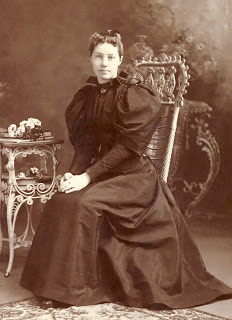 Mrs Beatrice Heidler/Watson.
Mrs Beatrice Heidler/Watson.
Nathaniel Heidler.... Born in 1880. He worked at various jobs in Lyme Regis including those of a boot-boy, fisherman and gardener. He married his childhood sweetheart, Elizabeth Hill, in 1901 and with financial help from his mother, was able to purchase a cottage in Coombe Street. A son, Andrew, was born to them in late 1903 and a daughter, Jennifer, in 1905. Nathaniel enlisted in the Dorset Regiment when the Great War began. He was wounded at Verdun in November 1916 and mentioned in dispatches. Finding life difficult in Lyme after the war, he took over the running of a farm near High Wycombe in Buckinghamshire. He died in 1974.
Elizabeth Hill/Heidler..... Born in January 1881. Miss Hill lost both her parents during an outbreak of influenza in 1894 and came to live with her aunt, Mrs Irene Hannington. She was schooled at home, along with her cousin Rose, by Mrs Hannington. 1896 brought further tragedies when Rose was murdered and Elizabeth herself abducted, but saved through the efforts of Nathaniel. When the family moved to Buckinghamshire in 1923, Elizabeth became a housekeeper for a family in Princes Risborough and stayed with them until 1939. She died as a result of a road accident in 1957. Andrew Heidler became a successful furniture maker in High Wycombe, a tradition his own sons, Derek and Adrian carry on. Jennifer was last heard of by the family in Australia in 1936, after that all contact was lost.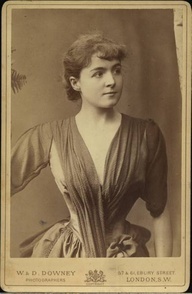 Elizabeth Hill/Heidler
Elizabeth Hill/Heidler
Lydia Hutchings.... Lydia was born in 1884, the youngest of four siblings. While still at school she helped Mrs Heidler out at the boarding-house and also at a local tea-room. Upon leaving school, she joined a theatre group and toured England before pitching up in London where she obtained work in both music-halls and theatres. Her one-woman shows became legendary; amongst others, she portrayed, Mary Anning, Joan of Arc, Mary Queen of Scots and Boudicca. In 1916 she received numerous accolades for her playing of Hamlet at the Adelphi theatre. Lydia can be spotted in early British films of the period including a early Alfred Hitchcock production. She was an occasional splendid matriarchal figure in the Powell-Pressburger films of the fifties. Little is known of her life after that time and she all but disappeared from public view until she popped up to do a reading at Nathaniel Heidler’s funeral in 1974.
Irene Hannington.... Was born in 1850, Irene Charles and spent her childhood in Chatham. She became a music teacher of some repute and became very well respected. In 1874 she entered the household of the Hannington family to teach the two youngest step-children and fell for Henry Hannington’s own son, Richard. They married in 1876 and their daughter, Rose, was born in 1878. Richard Hannington was to become a very successful banker and also an MP. He kept their townhouse in Chelsea, but bought for family holidays, a fine house near Lyme. This became the full-time family home in 1891. After the death of Rose in 1896, Richard rarely came to the family home. Irene lived alone in the house until her death in 1931.
Constable/Sergeant Street... Joe Street was a Lyme man, born in 1871. He joined the police force in 1894, the year after marrying a local girl, Belinda. Promotion to Sergeant came about in 1899, a rank he kept until he retired from the police force at the end of the Great War. Thereafter he ran a tobacconists in Lyme Regis and also became involved in civic duties as Town Crier. He and Belinda retired to Bexhill on Sea in 1938 where he served as captain of the local Home Guard. Belinda’s career as a teacher was long and fruitful and culminated in being given the post of Headmistress at the Devon Girl’s Academy in Sidmouth. 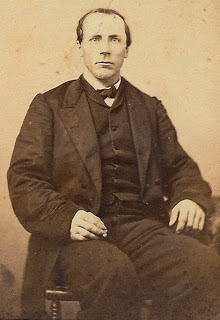 Joe Street
Joe Street
Constable John Legg.... John Legg was born in Lyme Regis during 1879. His education was unexceptional and he was often behind escapades such as scrumping around the town along with other misdemeanours. It was surprising then, that he elected to join the police force in 1898. He was a dependable and brave officer who became firm friends with Joe Street. In early 1904 he married Miss Beth Markey and they settled down together in a small flat in Pound Road. Like Nathaniel Heidler, he too joined the Dorset Regiment with the outbreak of war. They fought together and were wounded together at Verdun. He was last seen leading a charge across no-man’s land at Amiens in August 1918. His body was never recovered. Beth Legg never re-married and devoted her life to her two daughters, Amy and Marie who both attended Somerville College and were taken under the wing of Dame Emily Penrose. Beth herself became a local journalist of note once Amy and Marie had fled the nest, editing two local newspapers.
Doctor Godfrey Jacobs.... Dr Jacobs was a London man, born in Lewisham in 1852. He took his degree at London University where he met a young John Watson. Jacobs joined Watson in the Blackheath rugby side where he was affectionately known as ‘Godders’. He was a full back with a devastating turn of speed and an accurate passer of the ball. He and Watson won many games for their side almost single-handedly. After his marriage (see below) he went into general practice in Shoreditch and in 1891 took an opportunity offered to him to take over a practice in Lyme Regis. He was later to serve as Chief Medical Officer for the town and later, for the whole of Dorset. He died of a heart attack whilst out fishing in 1919.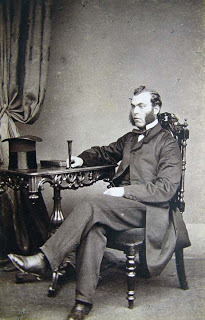 Dr Godfrey Jacobs
Dr Godfrey Jacobs
Sarah Jacob... Sarah was born September 1865 in the village of Hook Norton. Her family moved to London in 1878 and she completed her education at the Shoreditch School For Girls. Failing to obtain her degree in nursing, she became an assistant at the local medical practice where she met Godfrey Jacobs. They married in 1886 within four months of their first meeting. By 1896 when the family migrated to Dorset they had two children, Arthur born in 1887 and Cecil who arrived in 1889. Violet came into the world in late 1896 to complete the family. Sarah continued to assist her husband in the running of his practice. When war broke out she elected to join the VAD (Voluntary Aid Detachment) and although most of her time was spent in hospitals here, she did find herself in France with the British Expeditionary Force. After the tragic events (see below) of the war and the death of her husband, Sarah set up a women’s charity in Dorset which she was involved in for the rest of her life. Sarah Jacobs died in 1952 following a series of strokes.
Arthur Jacobs... Arthur followed in his father’s footsteps and attended London University medical school. He graduated in 1910 and became an under-surgeon at Barts. When the 1914 conflict began he offered his services as a soldier rather than a doctor/surgeon. His first action was in the rearguard action at Le Cateau and he then became involved in the first Battle of the Marne where he lost his life.
Cecil Jacobs.... Cecil bucked the trend started by his father and older brother by opting for the life of a farmer, beginning as a farm-hand on a large farm near Rousdon. In 1911 at the age of twenty-two he acquired his own small-holding which grew into something much larger. He volunteered for active service as soon as the Great War began. He was wounded during the Battle of the Marne where his brother fell. He was invalided home but rejoined his regiment in early 1915 and died at Neuve-Chappelle.
Violet Jacobs... Violet’s happy childhood gave way to the horrors of her teens when she lost both her brothers during the Great War and then her father a few years later when she was twenty-three. The sorrows that she suffered during the war resulted in a staunch pacifism which punctuated and drove her long life. She became a teacher after gaining a late degree in 1921; she taught politics and social history and became a noted member of the British Peace Movement and the Labour Party. She held junior ministerial positions in Labour governments up until 1974 (when she was 78) and was a fearsome back-bencher who none argued with if they had any sense. Violet never married and died in her sleep late 1995 in her one-hundredth year.
William Curtis... Believed to have been born in 1825 or 1826. He spent most of his early life as a farmer, being the son of a farmer. He very suddenly took off for France in 1853, citing a hitherto unknown hankering for the life of an artist. He returned to Lyme in 1874 and resumed his farming activities at first and then buying himself a pony and trap he became an affordable means of transport for many citizens. He grew more eccentric in his habits and clothing as the years went by. He was a man of few words except mostly to himself. It was no surprise to be transported by William and to hear him grumbling away in a Dorset-French accent. In July of 1904 he set off for Seaton to collect a family who were requiring onward travel to Lyme. He never arrived and was never seen again.
Inspector James Baddeley.... James Baddeley was born into a poor family in Dorchester in 1843. He completed his schooling in 1858 and eventually drifted into the Dorset Constabulary after a spell as a cabbie. He was promoted to the rank of inspector in 1881 and posted to Bridport where he was to remain until he retired in 1902. He elected to the town council there in 1905 and served two terms as Town Mayor (1906-1908 and 1909-1911). He died after a short illness in 1924.
Sergeant Alfred Quick... A Lyme man through and through. He was a dogged policeman who stood for no nonsense. Firm and fair, he was well respected in the town. After retiring from the police force in 1897 he became the landlord of The Volunteer Arms where he was to remain until his death at the age 70 in 1916. John Legg
John Legg
Matthew Johnson.... Born in the North of England during the hot summer of 1875. That long, hot and dry summer was the death knell for his father’s farm and the family migrated to Birmingham and eventually to Exeter. Matthew went his own way in 1896 and pitched up in Lyme Regis. After losing his employment in the town he moved to Brighton and became well-known in house-agent circles there before heading back to Dorset. Johnson and Johnson became one of Dorset’s most respected land-agents, so much so that Matthew was able to retire in 1928 and lived out his remaining years in his beloved Lake District.
Lt Matthew Webb... A Devon man, he was born in Okehampton in 1880. He joined the Royal Navy in1898 and rose rapidly through the ranks. He became an Admiral in 1919 and spent much of his time sitting behind a desk in Whitehall. Tiring of this he retired from the Navy and moved to Spain in 1925 and became the proprietor of San Sebastian’s first tattoo parlour. He was proud to have tattooed members of both factions during the civil war there. The tattoo parlour was sold off in 1950 and history is silent thereafter on the exploits of Mr Webb.
Count Orlana.... A nobleman, born in 1384 in a remote part of Transylvania. At some point in his bloodthirsty life he became a vampire, indeed the most feared of vampires. His life was finally extinguished in 1896……or was it?
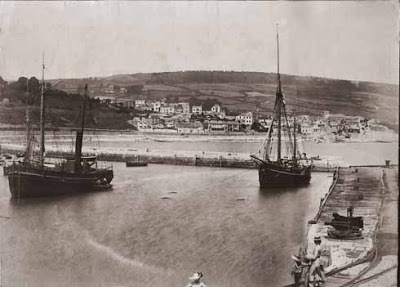 Lyme harbour 1890's.
Lyme harbour 1890's.
Beatrice Heidler/Watson.....Mrs Beatrice Heidler in 1902, became Watson’s second wife. They had first met in 1896 during the adventure chronicled by Watson as ‘The Lyme Regis Horror’. She was born, Beatrice Walker, in 1859 and married Henry Heidler (d. February 28th 1881) in January 1880. Nathaniel, her son, was born in October 1880. After her husband’s death at the battle of Majuba Hill, she was invited by her Aunt Letitia to come and keep house for her in Lyme Regis. Upon the passing of her aunt, Mrs Heidler turned the house into a boarding-establishment. Mrs Beatrice Watson died of pneumonia in 1947.
 Mrs Beatrice Heidler/Watson.
Mrs Beatrice Heidler/Watson.Nathaniel Heidler.... Born in 1880. He worked at various jobs in Lyme Regis including those of a boot-boy, fisherman and gardener. He married his childhood sweetheart, Elizabeth Hill, in 1901 and with financial help from his mother, was able to purchase a cottage in Coombe Street. A son, Andrew, was born to them in late 1903 and a daughter, Jennifer, in 1905. Nathaniel enlisted in the Dorset Regiment when the Great War began. He was wounded at Verdun in November 1916 and mentioned in dispatches. Finding life difficult in Lyme after the war, he took over the running of a farm near High Wycombe in Buckinghamshire. He died in 1974.
Elizabeth Hill/Heidler..... Born in January 1881. Miss Hill lost both her parents during an outbreak of influenza in 1894 and came to live with her aunt, Mrs Irene Hannington. She was schooled at home, along with her cousin Rose, by Mrs Hannington. 1896 brought further tragedies when Rose was murdered and Elizabeth herself abducted, but saved through the efforts of Nathaniel. When the family moved to Buckinghamshire in 1923, Elizabeth became a housekeeper for a family in Princes Risborough and stayed with them until 1939. She died as a result of a road accident in 1957. Andrew Heidler became a successful furniture maker in High Wycombe, a tradition his own sons, Derek and Adrian carry on. Jennifer was last heard of by the family in Australia in 1936, after that all contact was lost.
 Elizabeth Hill/Heidler
Elizabeth Hill/HeidlerLydia Hutchings.... Lydia was born in 1884, the youngest of four siblings. While still at school she helped Mrs Heidler out at the boarding-house and also at a local tea-room. Upon leaving school, she joined a theatre group and toured England before pitching up in London where she obtained work in both music-halls and theatres. Her one-woman shows became legendary; amongst others, she portrayed, Mary Anning, Joan of Arc, Mary Queen of Scots and Boudicca. In 1916 she received numerous accolades for her playing of Hamlet at the Adelphi theatre. Lydia can be spotted in early British films of the period including a early Alfred Hitchcock production. She was an occasional splendid matriarchal figure in the Powell-Pressburger films of the fifties. Little is known of her life after that time and she all but disappeared from public view until she popped up to do a reading at Nathaniel Heidler’s funeral in 1974.
Irene Hannington.... Was born in 1850, Irene Charles and spent her childhood in Chatham. She became a music teacher of some repute and became very well respected. In 1874 she entered the household of the Hannington family to teach the two youngest step-children and fell for Henry Hannington’s own son, Richard. They married in 1876 and their daughter, Rose, was born in 1878. Richard Hannington was to become a very successful banker and also an MP. He kept their townhouse in Chelsea, but bought for family holidays, a fine house near Lyme. This became the full-time family home in 1891. After the death of Rose in 1896, Richard rarely came to the family home. Irene lived alone in the house until her death in 1931.
Constable/Sergeant Street... Joe Street was a Lyme man, born in 1871. He joined the police force in 1894, the year after marrying a local girl, Belinda. Promotion to Sergeant came about in 1899, a rank he kept until he retired from the police force at the end of the Great War. Thereafter he ran a tobacconists in Lyme Regis and also became involved in civic duties as Town Crier. He and Belinda retired to Bexhill on Sea in 1938 where he served as captain of the local Home Guard. Belinda’s career as a teacher was long and fruitful and culminated in being given the post of Headmistress at the Devon Girl’s Academy in Sidmouth.
 Joe Street
Joe StreetConstable John Legg.... John Legg was born in Lyme Regis during 1879. His education was unexceptional and he was often behind escapades such as scrumping around the town along with other misdemeanours. It was surprising then, that he elected to join the police force in 1898. He was a dependable and brave officer who became firm friends with Joe Street. In early 1904 he married Miss Beth Markey and they settled down together in a small flat in Pound Road. Like Nathaniel Heidler, he too joined the Dorset Regiment with the outbreak of war. They fought together and were wounded together at Verdun. He was last seen leading a charge across no-man’s land at Amiens in August 1918. His body was never recovered. Beth Legg never re-married and devoted her life to her two daughters, Amy and Marie who both attended Somerville College and were taken under the wing of Dame Emily Penrose. Beth herself became a local journalist of note once Amy and Marie had fled the nest, editing two local newspapers.
Doctor Godfrey Jacobs.... Dr Jacobs was a London man, born in Lewisham in 1852. He took his degree at London University where he met a young John Watson. Jacobs joined Watson in the Blackheath rugby side where he was affectionately known as ‘Godders’. He was a full back with a devastating turn of speed and an accurate passer of the ball. He and Watson won many games for their side almost single-handedly. After his marriage (see below) he went into general practice in Shoreditch and in 1891 took an opportunity offered to him to take over a practice in Lyme Regis. He was later to serve as Chief Medical Officer for the town and later, for the whole of Dorset. He died of a heart attack whilst out fishing in 1919.
 Dr Godfrey Jacobs
Dr Godfrey JacobsSarah Jacob... Sarah was born September 1865 in the village of Hook Norton. Her family moved to London in 1878 and she completed her education at the Shoreditch School For Girls. Failing to obtain her degree in nursing, she became an assistant at the local medical practice where she met Godfrey Jacobs. They married in 1886 within four months of their first meeting. By 1896 when the family migrated to Dorset they had two children, Arthur born in 1887 and Cecil who arrived in 1889. Violet came into the world in late 1896 to complete the family. Sarah continued to assist her husband in the running of his practice. When war broke out she elected to join the VAD (Voluntary Aid Detachment) and although most of her time was spent in hospitals here, she did find herself in France with the British Expeditionary Force. After the tragic events (see below) of the war and the death of her husband, Sarah set up a women’s charity in Dorset which she was involved in for the rest of her life. Sarah Jacobs died in 1952 following a series of strokes.
Arthur Jacobs... Arthur followed in his father’s footsteps and attended London University medical school. He graduated in 1910 and became an under-surgeon at Barts. When the 1914 conflict began he offered his services as a soldier rather than a doctor/surgeon. His first action was in the rearguard action at Le Cateau and he then became involved in the first Battle of the Marne where he lost his life.
Cecil Jacobs.... Cecil bucked the trend started by his father and older brother by opting for the life of a farmer, beginning as a farm-hand on a large farm near Rousdon. In 1911 at the age of twenty-two he acquired his own small-holding which grew into something much larger. He volunteered for active service as soon as the Great War began. He was wounded during the Battle of the Marne where his brother fell. He was invalided home but rejoined his regiment in early 1915 and died at Neuve-Chappelle.
Violet Jacobs... Violet’s happy childhood gave way to the horrors of her teens when she lost both her brothers during the Great War and then her father a few years later when she was twenty-three. The sorrows that she suffered during the war resulted in a staunch pacifism which punctuated and drove her long life. She became a teacher after gaining a late degree in 1921; she taught politics and social history and became a noted member of the British Peace Movement and the Labour Party. She held junior ministerial positions in Labour governments up until 1974 (when she was 78) and was a fearsome back-bencher who none argued with if they had any sense. Violet never married and died in her sleep late 1995 in her one-hundredth year.
William Curtis... Believed to have been born in 1825 or 1826. He spent most of his early life as a farmer, being the son of a farmer. He very suddenly took off for France in 1853, citing a hitherto unknown hankering for the life of an artist. He returned to Lyme in 1874 and resumed his farming activities at first and then buying himself a pony and trap he became an affordable means of transport for many citizens. He grew more eccentric in his habits and clothing as the years went by. He was a man of few words except mostly to himself. It was no surprise to be transported by William and to hear him grumbling away in a Dorset-French accent. In July of 1904 he set off for Seaton to collect a family who were requiring onward travel to Lyme. He never arrived and was never seen again.
Inspector James Baddeley.... James Baddeley was born into a poor family in Dorchester in 1843. He completed his schooling in 1858 and eventually drifted into the Dorset Constabulary after a spell as a cabbie. He was promoted to the rank of inspector in 1881 and posted to Bridport where he was to remain until he retired in 1902. He elected to the town council there in 1905 and served two terms as Town Mayor (1906-1908 and 1909-1911). He died after a short illness in 1924.
Sergeant Alfred Quick... A Lyme man through and through. He was a dogged policeman who stood for no nonsense. Firm and fair, he was well respected in the town. After retiring from the police force in 1897 he became the landlord of The Volunteer Arms where he was to remain until his death at the age 70 in 1916.
 John Legg
John LeggMatthew Johnson.... Born in the North of England during the hot summer of 1875. That long, hot and dry summer was the death knell for his father’s farm and the family migrated to Birmingham and eventually to Exeter. Matthew went his own way in 1896 and pitched up in Lyme Regis. After losing his employment in the town he moved to Brighton and became well-known in house-agent circles there before heading back to Dorset. Johnson and Johnson became one of Dorset’s most respected land-agents, so much so that Matthew was able to retire in 1928 and lived out his remaining years in his beloved Lake District.
Lt Matthew Webb... A Devon man, he was born in Okehampton in 1880. He joined the Royal Navy in1898 and rose rapidly through the ranks. He became an Admiral in 1919 and spent much of his time sitting behind a desk in Whitehall. Tiring of this he retired from the Navy and moved to Spain in 1925 and became the proprietor of San Sebastian’s first tattoo parlour. He was proud to have tattooed members of both factions during the civil war there. The tattoo parlour was sold off in 1950 and history is silent thereafter on the exploits of Mr Webb.
Count Orlana.... A nobleman, born in 1384 in a remote part of Transylvania. At some point in his bloodthirsty life he became a vampire, indeed the most feared of vampires. His life was finally extinguished in 1896……or was it?
 Lyme harbour 1890's.
Lyme harbour 1890's.
Published on March 27, 2013 06:08
March 14, 2013
Groan!!!
I find it recorded in my notebook that it was a foggy evening in late November 1895 on which the singular series of events that became known to the public at large as “The Case of the Cornish Pasty” first began. Holmes and I were seated on either side of a blazing log fire in our Baker Street rooms; he was apparently engrossed in the latest edition of the Strand magazine and all the time muttering the odd word about sensationalism which I took as reference to my humble attempts to publicise his work to the general public. I vowed to take no notice of these mutterings and continued to read an article in the Lancet, a fascinating but patently absurd piece about the transplanting of human organs, even myself as a medical man could see what ineffable twaddle this was, and moreover, the piece in question soon became extremely tedious and I confess that, after a few minutes, I had fallen into a brown study.
Suddenly, Holmes looked up from his reading. “I notice, Watson,” he said, “that you have visited your hairdresser this morning.”
“Merciful Heavens, Holmes!” I ejaculated. “How could you possibly have known that?”
“You know my methods,” my friend murmured, almost to himself " Must I explain everything to you my friend ?"
Then suddenly, Holmes’s mood appeared to change in an instant, as he jumped up and waved his magazine excitedly in my face. “But tell me, Watson, what do you make of the little piece on the back page of this most estimable periodical.”
I took the paper from Holmes’s hand and began to read aloud from a half-page advertisement.
“Amazing treasure hunt! Solid gold Cornish pasty buried in grounds of new restaurant by eccentric millionaire Sir Peter Rattenbury. Location of the restaurant to be revealed once the item has been found. Finder may keep the treasure and be the first guest at the Lemon Tree restaurant located…where?”
“A pretty puzzle, I’m sure you’ll agree, Watson.”
“A pretty puzzle indeed. But surely, Holmes, the chances of us.. or anyone...being able to find the treasure with so little information provided are so small as to be infinitesimal.”
“On the contrary, Watson. In fact, I fancy we may be able to solve this little mystery without leaving the comfort of our arm chairs.”
“Surely not, Holmes!” I protested
“Look, Watson, at the photograph of Sir Peter at the bottom of the page, which the caption states was taken on his spacious estate near Lyme Regis on the south coast."
“I confess that I can see nothing of interest whatsoever,” I admitted.
“You see, Watson, but you do not observe. Make deductions as I have shown you so often in the past. If you do, then you will arrive at the inevitable conclusion that Sir Peter Rattenbury has buried the precious comestible, and therefore intends to set up his restaurant, in the grounds of his own home.”
“Really, Holmes, this is too much. I fail to see how you have arrived at that conclusion.”
“Think, Watson. The name of the restaurant. Now look again at the picture of Sir Peter standing next to this subtropical arboreal plant and the crop of yellow fruit it so obviously displays.”
But how…?!” I spluttered.
Holmes looked at me. A wry smile played across his face.
“It’s a lemon-tree my dear Watson.”
Suddenly, Holmes looked up from his reading. “I notice, Watson,” he said, “that you have visited your hairdresser this morning.”
“Merciful Heavens, Holmes!” I ejaculated. “How could you possibly have known that?”
“You know my methods,” my friend murmured, almost to himself " Must I explain everything to you my friend ?"
Then suddenly, Holmes’s mood appeared to change in an instant, as he jumped up and waved his magazine excitedly in my face. “But tell me, Watson, what do you make of the little piece on the back page of this most estimable periodical.”
I took the paper from Holmes’s hand and began to read aloud from a half-page advertisement.
“Amazing treasure hunt! Solid gold Cornish pasty buried in grounds of new restaurant by eccentric millionaire Sir Peter Rattenbury. Location of the restaurant to be revealed once the item has been found. Finder may keep the treasure and be the first guest at the Lemon Tree restaurant located…where?”
“A pretty puzzle, I’m sure you’ll agree, Watson.”
“A pretty puzzle indeed. But surely, Holmes, the chances of us.. or anyone...being able to find the treasure with so little information provided are so small as to be infinitesimal.”
“On the contrary, Watson. In fact, I fancy we may be able to solve this little mystery without leaving the comfort of our arm chairs.”
“Surely not, Holmes!” I protested
“Look, Watson, at the photograph of Sir Peter at the bottom of the page, which the caption states was taken on his spacious estate near Lyme Regis on the south coast."
“I confess that I can see nothing of interest whatsoever,” I admitted.
“You see, Watson, but you do not observe. Make deductions as I have shown you so often in the past. If you do, then you will arrive at the inevitable conclusion that Sir Peter Rattenbury has buried the precious comestible, and therefore intends to set up his restaurant, in the grounds of his own home.”
“Really, Holmes, this is too much. I fail to see how you have arrived at that conclusion.”
“Think, Watson. The name of the restaurant. Now look again at the picture of Sir Peter standing next to this subtropical arboreal plant and the crop of yellow fruit it so obviously displays.”
But how…?!” I spluttered.
Holmes looked at me. A wry smile played across his face.
“It’s a lemon-tree my dear Watson.”
Published on March 14, 2013 09:17
February 26, 2013
A review of Mike Hogan's 'Sherlock Holmes & Young Winston: The Jubilee Plot
June 1887. As the climax of her Golden Jubilee celebrations, Queen Victoria will join more than fifty foreign monarchs and heads of state, her peers of the realm and her ministers in a service of thanksgiving at Westminster Abbey. Spymasters in the newly created Special (Irish) Branch of Scotland Yard inform the Prime Minister that blood-oath Irish Republican fanatics vow to wipe out the Queen and her family; Fenian assassins will throw bombs of terrible potency using the new explosive, dynamite. Sherlock Holmes and his companions Doctor Watson and young Winston Churchill are called in not only to prevent a dynamite outrage against the Queen, but to avert a catastrophic war that might bring down the Empire. As the plot unravels, they find it harder and harder to determine who they can trust even at the highest levels of the government. Who is spying on whom?
 Holmes and Watson team up once more with the schoolboy, Winston Churchill in a dark tale of politics and political uprising and plotting. As with his previous outing, Mike Hogan's own plotting is second to none. the pace is leisurely at times and then grips hard when required. The book opens with a gorgeous scene between Holmes and Watson in which Watson is trying to do the 'household' accounts. he fails to bring home the importance of frugality to Holmes and that becomes a recurring theme of the tale. 'Take the underground', cries the good Doctor. The result: a cab! The dialogiue in this opening scene displays the warth of the characters to each other and Mr Hogan's unerring way with dialogue which is witty without ever being forced. This scene is closely followed by one involving Lord Salisbury which matches the opening scene in its splendid dialogue. The novel goes from strength to strength after that, plots and sub-plots fly by all deftly handled. Moriarty makes an entrance, still the Napoleon of crime that we know him to be, but with the saving grace of being an Englishman! This is the kind of pastiche that gives pastiches a good name. I am inclined to think it's the one of the best pastiches of the last twenty years.
Holmes and Watson team up once more with the schoolboy, Winston Churchill in a dark tale of politics and political uprising and plotting. As with his previous outing, Mike Hogan's own plotting is second to none. the pace is leisurely at times and then grips hard when required. The book opens with a gorgeous scene between Holmes and Watson in which Watson is trying to do the 'household' accounts. he fails to bring home the importance of frugality to Holmes and that becomes a recurring theme of the tale. 'Take the underground', cries the good Doctor. The result: a cab! The dialogiue in this opening scene displays the warth of the characters to each other and Mr Hogan's unerring way with dialogue which is witty without ever being forced. This scene is closely followed by one involving Lord Salisbury which matches the opening scene in its splendid dialogue. The novel goes from strength to strength after that, plots and sub-plots fly by all deftly handled. Moriarty makes an entrance, still the Napoleon of crime that we know him to be, but with the saving grace of being an Englishman! This is the kind of pastiche that gives pastiches a good name. I am inclined to think it's the one of the best pastiches of the last twenty years.
Visit Mike's website to learn more and to follow links to purchase the Holmes/Young Winston trilogy: http://www.mikehoganbooks.co.uk/the-sherlock-and-winston-series/
 Holmes and Watson team up once more with the schoolboy, Winston Churchill in a dark tale of politics and political uprising and plotting. As with his previous outing, Mike Hogan's own plotting is second to none. the pace is leisurely at times and then grips hard when required. The book opens with a gorgeous scene between Holmes and Watson in which Watson is trying to do the 'household' accounts. he fails to bring home the importance of frugality to Holmes and that becomes a recurring theme of the tale. 'Take the underground', cries the good Doctor. The result: a cab! The dialogiue in this opening scene displays the warth of the characters to each other and Mr Hogan's unerring way with dialogue which is witty without ever being forced. This scene is closely followed by one involving Lord Salisbury which matches the opening scene in its splendid dialogue. The novel goes from strength to strength after that, plots and sub-plots fly by all deftly handled. Moriarty makes an entrance, still the Napoleon of crime that we know him to be, but with the saving grace of being an Englishman! This is the kind of pastiche that gives pastiches a good name. I am inclined to think it's the one of the best pastiches of the last twenty years.
Holmes and Watson team up once more with the schoolboy, Winston Churchill in a dark tale of politics and political uprising and plotting. As with his previous outing, Mike Hogan's own plotting is second to none. the pace is leisurely at times and then grips hard when required. The book opens with a gorgeous scene between Holmes and Watson in which Watson is trying to do the 'household' accounts. he fails to bring home the importance of frugality to Holmes and that becomes a recurring theme of the tale. 'Take the underground', cries the good Doctor. The result: a cab! The dialogiue in this opening scene displays the warth of the characters to each other and Mr Hogan's unerring way with dialogue which is witty without ever being forced. This scene is closely followed by one involving Lord Salisbury which matches the opening scene in its splendid dialogue. The novel goes from strength to strength after that, plots and sub-plots fly by all deftly handled. Moriarty makes an entrance, still the Napoleon of crime that we know him to be, but with the saving grace of being an Englishman! This is the kind of pastiche that gives pastiches a good name. I am inclined to think it's the one of the best pastiches of the last twenty years. Visit Mike's website to learn more and to follow links to purchase the Holmes/Young Winston trilogy: http://www.mikehoganbooks.co.uk/the-sherlock-and-winston-series/
Published on February 26, 2013 04:33
February 2, 2013
An interview with Amy Thomas.
I was fortunate enough to pop a few questions to Sherlock Holmes author and Baker Street Babe, Amy Thomas recently....here is what she had to say.
When did your love of Holmes originate and how?
My first formative memory of Holmes occurred some time before the age of ten. My sister, who is a little older than I am, was getting into the stories, and I checked an audiobook version out of the library. My strongest recollection is that I was scared witless by "The Speckled Band." I went on to read many of the stories and was heartbroken when Holmes "died," until my sister relieved my misery by revealing that he lived on in more stories. Several years later, a friend gave me a copy of The Beekeeper's Apprentice by Laurie R. King, and my love of pastiche was born.
 Are your parents big readers, did your love of reading stem from them?
Are your parents big readers, did your love of reading stem from them?
My parents are both hugely into reading. My mother has a master's degree in reading education, and she homeschooled me for several years. Her philosophy is that the best way to raise a child who loves reading is simply for parents to have books available and read a lot themselves. This was totally true for me, and homeschooling gave me an opportunity to read many classics, including the Holmes stories.
Your first novel was well received, were you already forming the notion of a second excursion at that time?
While I was writing the first book, I certainly had other potential plot ideas rattling around in my head. Sherlock Holmes and Irene Adler are such rich and complex characters that I believe there's nearly unlimited potential for stories about them. I started The Detective, The Woman, and The Winking Tree soon after I finished my first book, but I didn't sit down to really get everything on paper for several months.
Assuming the series continues, do you already see where the future lies with regards to Sherlock Holmes and Irene Adler?
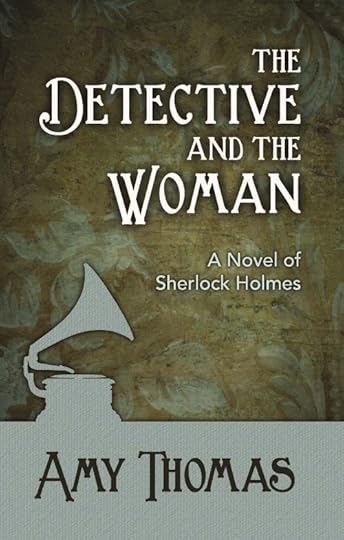 In terms of timeline, the second book is sandwiched between the end of the case that I detailed in The Detective and The Woman, but before the events that the Epilogue implies. Without spoiling those who may not have read the first book yet, I would say that I've already revealed one big piece of the puzzle of where the characters end up. The second book continues the process toward that conclusion and adds more pieces of the puzzle, alongside a new mystery.
In terms of timeline, the second book is sandwiched between the end of the case that I detailed in The Detective and The Woman, but before the events that the Epilogue implies. Without spoiling those who may not have read the first book yet, I would say that I've already revealed one big piece of the puzzle of where the characters end up. The second book continues the process toward that conclusion and adds more pieces of the puzzle, alongside a new mystery.
That answers a question that I was going to ask regarding that epilogue! You mention in your new novel your writing partners. Can you tell us a bit about them and how it works?
I have two amazing writing partners, one of whom lives near me and another one who is all the way across the country. I credit my long-distance writing partner with instilling a lot of the confidence that made me able to write a book in the first place. We exchange writing samples with each other online and critique and comment on one another's writing regularly. She's finished several books and is a great voice of encouragement and suggestion. My other partner, the one in town, is my local cheerleader. She writes for children, a very different genre from mine, obviously, but she has a great understanding of the challenges and ups and downs of the writing/publishing process. Her positive outlook helps me keep going.
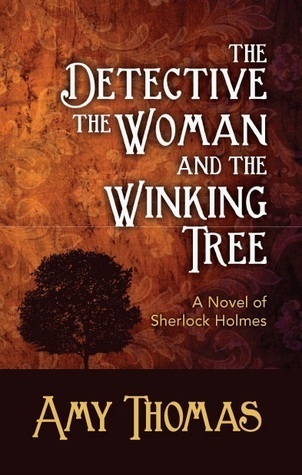 What differences did you find in setting the new novel in England as opposed to America? Did it call for greater research?
What differences did you find in setting the new novel in England as opposed to America? Did it call for greater research?
One of the reasons Winking Tree took longer for me to write than its predecessor is that I was certainly challenged by the prospect of an English setting. As much as I would have liked to set all my books in south Florida, which is familiar to me, it wouldn't have made any sense for England's greatest detective to keep popping up in such an unusual context. I knew that I needed to bite the bullet and take both characters back to a more traditional Holmesian setting. When writing about England, I definitely paid attention to social conventions and ways of speaking, word usage, and manner. Florida at the turn of the century was a little bit wild, but the English countryside before the Great War was a more traditional place. As with my first book, I researched as I wrote and forced myself to be ruthless about jettisoning anything I wasn't sure about. I've been to England more than once, read more English books than I can recollect from several different eras, and consumed a lot of English media of other types as well. Those things definitely helped, though I still spent considerable time on particular questions that came up.
And what part do the Baker Street Babes play in your life? How did your involvement with them come about?
The Baker Street Babes, the ladies that comprise an international, all-female, Holmes-themed podcast, were kind enough to invite me to join them at the beginning of 2012. In addition to being part of recorded interviews and discussions, I also review Holmes-related literature for www.bakerstreetbabes.com ;
And what next for you?
Writing about Sherlock Holmes is addictive! I've started to sketch out ideas for my next book starring the world's greatest detective and the inimitable Irene Adler.
Thanks Amy. Visit Amy's page for her Holmesian insights and information about her two novels, The Detective and The Woman, and The Detective, The Woman and The Winking Tree (released on February 13th). News there too of a giveaway!!!
When did your love of Holmes originate and how?
My first formative memory of Holmes occurred some time before the age of ten. My sister, who is a little older than I am, was getting into the stories, and I checked an audiobook version out of the library. My strongest recollection is that I was scared witless by "The Speckled Band." I went on to read many of the stories and was heartbroken when Holmes "died," until my sister relieved my misery by revealing that he lived on in more stories. Several years later, a friend gave me a copy of The Beekeeper's Apprentice by Laurie R. King, and my love of pastiche was born.
 Are your parents big readers, did your love of reading stem from them?
Are your parents big readers, did your love of reading stem from them? My parents are both hugely into reading. My mother has a master's degree in reading education, and she homeschooled me for several years. Her philosophy is that the best way to raise a child who loves reading is simply for parents to have books available and read a lot themselves. This was totally true for me, and homeschooling gave me an opportunity to read many classics, including the Holmes stories.
Your first novel was well received, were you already forming the notion of a second excursion at that time?
While I was writing the first book, I certainly had other potential plot ideas rattling around in my head. Sherlock Holmes and Irene Adler are such rich and complex characters that I believe there's nearly unlimited potential for stories about them. I started The Detective, The Woman, and The Winking Tree soon after I finished my first book, but I didn't sit down to really get everything on paper for several months.
Assuming the series continues, do you already see where the future lies with regards to Sherlock Holmes and Irene Adler?
 In terms of timeline, the second book is sandwiched between the end of the case that I detailed in The Detective and The Woman, but before the events that the Epilogue implies. Without spoiling those who may not have read the first book yet, I would say that I've already revealed one big piece of the puzzle of where the characters end up. The second book continues the process toward that conclusion and adds more pieces of the puzzle, alongside a new mystery.
In terms of timeline, the second book is sandwiched between the end of the case that I detailed in The Detective and The Woman, but before the events that the Epilogue implies. Without spoiling those who may not have read the first book yet, I would say that I've already revealed one big piece of the puzzle of where the characters end up. The second book continues the process toward that conclusion and adds more pieces of the puzzle, alongside a new mystery. That answers a question that I was going to ask regarding that epilogue! You mention in your new novel your writing partners. Can you tell us a bit about them and how it works?
I have two amazing writing partners, one of whom lives near me and another one who is all the way across the country. I credit my long-distance writing partner with instilling a lot of the confidence that made me able to write a book in the first place. We exchange writing samples with each other online and critique and comment on one another's writing regularly. She's finished several books and is a great voice of encouragement and suggestion. My other partner, the one in town, is my local cheerleader. She writes for children, a very different genre from mine, obviously, but she has a great understanding of the challenges and ups and downs of the writing/publishing process. Her positive outlook helps me keep going.
 What differences did you find in setting the new novel in England as opposed to America? Did it call for greater research?
What differences did you find in setting the new novel in England as opposed to America? Did it call for greater research? One of the reasons Winking Tree took longer for me to write than its predecessor is that I was certainly challenged by the prospect of an English setting. As much as I would have liked to set all my books in south Florida, which is familiar to me, it wouldn't have made any sense for England's greatest detective to keep popping up in such an unusual context. I knew that I needed to bite the bullet and take both characters back to a more traditional Holmesian setting. When writing about England, I definitely paid attention to social conventions and ways of speaking, word usage, and manner. Florida at the turn of the century was a little bit wild, but the English countryside before the Great War was a more traditional place. As with my first book, I researched as I wrote and forced myself to be ruthless about jettisoning anything I wasn't sure about. I've been to England more than once, read more English books than I can recollect from several different eras, and consumed a lot of English media of other types as well. Those things definitely helped, though I still spent considerable time on particular questions that came up.
And what part do the Baker Street Babes play in your life? How did your involvement with them come about?
The Baker Street Babes, the ladies that comprise an international, all-female, Holmes-themed podcast, were kind enough to invite me to join them at the beginning of 2012. In addition to being part of recorded interviews and discussions, I also review Holmes-related literature for www.bakerstreetbabes.com ;
And what next for you?
Writing about Sherlock Holmes is addictive! I've started to sketch out ideas for my next book starring the world's greatest detective and the inimitable Irene Adler.
Thanks Amy. Visit Amy's page for her Holmesian insights and information about her two novels, The Detective and The Woman, and The Detective, The Woman and The Winking Tree (released on February 13th). News there too of a giveaway!!!
Published on February 02, 2013 22:53
February 1, 2013
An invitation....
....no, not to a dance. Although.....no.....job in hand, David. It's an invitation to a Q&A with me on Goodreads. Ask what you want (within reason) and I will answer (within reason). Anything at all be it Holmesian, Lyme Regis...whatever.
Q & A with David Ruffle
Q & A with David Ruffle
Published on February 01, 2013 03:25



